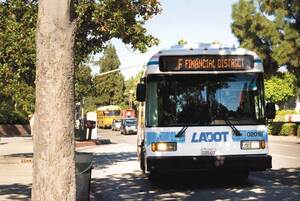LADOT considering higher fares and cuts to bus lines
In the coming weeks, the Los Angeles Department of Transportation will be analyzing its transit services to find ways to deal with impending budget deficits.
Though officials say it is unlikely the changes will affect the DASH that runs near USC, fares may increase and other lines may be cut in order to keep up with a rapidly depleting budget.

Wheels on the bus · The F DASH, which runs from USC to downtown daily, will likely remain in operation, but other lines may be cut and fares may go up as LADOT tries to save money. - Vicki Yang | Daily Trojan
“As funding has shrunk, it’s important to put the limited resources where they can count most,” said Bill Gillman, a spokesman for LADOT.
Gillman said LADOT is overdue for a line-by-line analysis evaluating the DASH, Commuter Express and Metro.
Philip Aker, transit planner and project development head, said a study conducted by an outside consultant projected that LADOT will face a $23-million deficit next year and a $260-million deficit in 10 years.
“We are going to have to increase revenue, cut services or a combination of both,” Aker said.
Aker said LADOT will likely need to increase its fares. Though he could not yet say what the fare raise would be, he did say it would be relatively small.
There are still no specific plans for what routes LADOT will cut, but spokesman Bill Gillman said the likelihood the F DASH — the line that runs near USC — will be cut is low because of its strong ridership.
The LADOT should have preliminary recommendations in the next two weeks and a more concrete plan on how to combat the projected budget deficits in four weeks.
“This is just the very beginning of the very beginning of the stages. We have nothing specifically planned,” Gillman said.
Students who use LADOT services said the potential changes were worrisome.
Elisa Bravo, a freshman majoring in Spanish, said even a small fare increase for the transit services could affect how often she rides the Metro.
“I ride the bus because I use it to get around, and I already think it’s a bit expensive,” she said. “If prices go up, it will seem less attractive to ride it.”
“I think it’ll make public transportation more difficult if they start cutting,” Andrea Coulter, a junior majoring in fine arts said. “Unless they use the buses from the cut lines to focus on the ones that are frequently used.”
Coulter, who frequently takes the commuter express and occasionally uses other lines like the DASH, said the she would be able to pay fares if they were raised, but would prefer taking a car.
Hannah Huang, a senior majoring in Electrical Engineering who said she uses the bus for basic transport, said the changes could make things worse.
“Certain lines are already infrequent,” Huang said. “I’d have to bike more or try to get rides from friends.”
Mimi Honeycutt contributed to this report.
